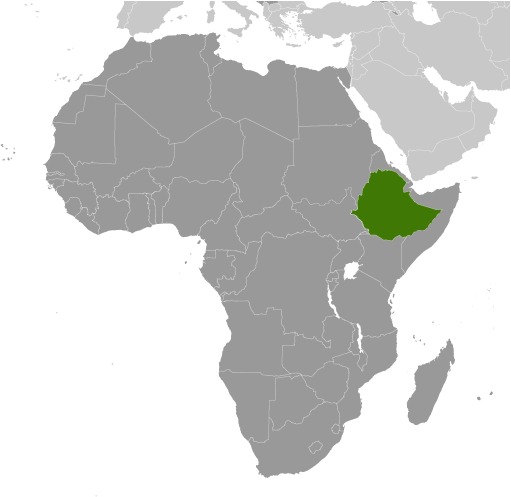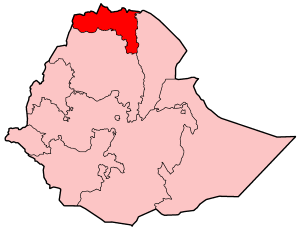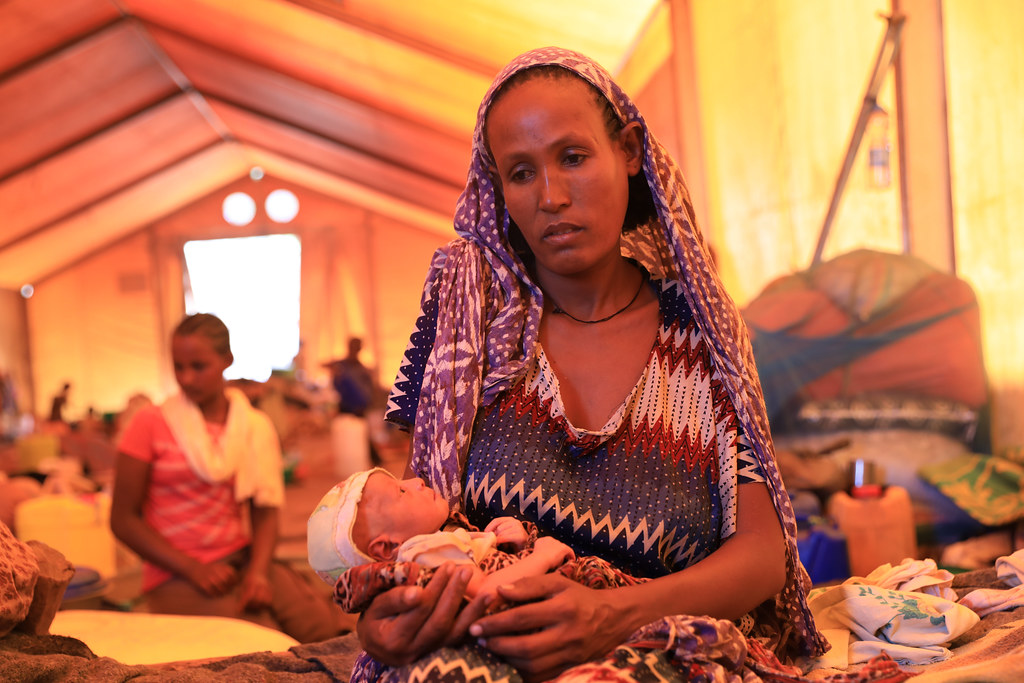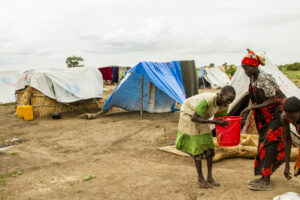Ethiopia, 2020 – present
Where
Ethiopia is an African nation bordered by Djibouti, Eritrea, Kenya, Somalia, South Sudan, and Sudan.[1] Its population of 111 million is composed of several ethnic groups, including Oromos (35%), Amharas (28%), Tigrayans (6%), Somalis (6%), and others.
Background

Map of Africa with Ethiopia indicated in green. Image courtesy of CIA World Factbook is located in the public domain.
Ethiopia is the oldest independent country in Africa. It was ruled by an emperor until 1974, when a Marxist-Leninist military junta, known as the Derg regime, seized power and violently suppressed political opposition.[1] In 1991, the Ethiopian People’s Revolutionary Democratic Front (EPRDF) overthrew the Derg regime and instituted a democratic government, placing power in regional ethnic governments.[1]
The EPRDF was a coalition government representing four regional parties, largely defined by ethnic identity: the Tigray People’s Liberation Front (TPLF), the Amhara Democratic Party, the Oromo Democratic Party, and the Southern Ethiopian People’s Democratic Movement.[2] The TPLF, which ruled the northern region of Tigray, dominated this coalition despite representing a small percent of the population. Under TPLF rule, the government fostered rapid economic growth and relative stability across Ethiopia.[3] However, it was criticized for human rights abuses, corruption, and inequality.
In 2018, the Parliament appointed Abiy Ahmed, a member of Parliament since 2010, as Prime Minister.[4] An ethnic Oromo, he won a Nobel Peace Prize in 2019 for negotiating an end to longstanding territorial conflicts with neighboring Eritrea in the Tigray region.[4] Ethiopia had been at war with Eritrea from 1998-2000, launching the two nations into a standing conflict that damaged both countries politically and economically.[5] In 2019, Abiy merged the EPRDF coalition into the single ‘Prosperity Party’ in the hopes of bridging ethnic divisions, liberalizing politics, and centralizing Ethiopian governance. The TPLF refused to join Abiy’s party but remained in control of Tigray’s regional government.[6] They resented Abiy’s deal with Eritrea and Tigrayans’ loss of power in his new government.
What
Political tensions between Abiy’s Prosperity Party and the TPLF persisted into 2020 – a federal election year for Ethiopia. Abiy received Parliamentary approval to postpone elections due to the onset of the coronavirus, which meant that he would remain in power unopposed until new elections would finally be held. The TPLF accused him of an authoritarian power grab and held regional elections in Tigray as an act of defiance. Abiy declared the Tigrayan election illegal and cut funds to Tigray’s government.
On November 4, 2020, anger and polarization turned to violence. TPLF forces overran an Ethiopian military base, allegedly to steal weapons. Prime Minister Abiy Ahmed ordered swift military retaliation. Ethiopian armed forces, aided by ethnic Amhara regional militias and troops from neighboring Eritrea, launched an offensive against the TPLF in Tigray within days.
There have been credible reports of crimes against humanity and civilian massacres perpetrated from all sides of the conflict against ethnic Tigrayan, Oromo, Amhara, Somali, and Gedeo civilians. Human rights groups are particularly concerned about a genocide of the Tigrayan people.
How

Ethiopia map with Tigray Region indicated in red. Image courtesy of Golbez is unmodified and licensed under CC BY 2.0.
Political tensions between Abiy’s Prosperity Party and the TPLF persisted into 2020,[6] which was supposed to be a federal election year for Ethiopia. Abiy received Parliamentary approval to postpone elections due to the onset of the coronavirus, which meant that he would remain in power unopposed until new elections could be held.[7] The TPLF accused him of an authoritarian power grab and held regional elections in Tigray as an act of defiance. Abiy declared the Tigrayan election illegal and cut funds to Tigray’s government.[8]
In November 2020, conflict erupted when TPLF forces overran an Ethiopian military base, allegedly to steal weapons.[9] Prime Minister Abiy Ahmed ordered swift military retaliation. Ethiopian armed forces, aided by ethnic Amhara regional militias and troops from neighboring Eritrea, launched an offensive against the TPLF in Tigray within days.[10] During the conflict, Prime Minister Abiy maintained that Eritrean forces were not involved, but later admitting in 2021 that was false. Abiy declared victory in Tigray after Ethiopian troops captured the region’s capital, Mekele, in November 2020.[10] However, intense fighting continued for two years.
A peace agreement, titled “Agreement for Lasting Peace,” mediated by the African Union (AU), was signed in 2022 between the Ethiopian government and the TPLF.[11] Meant to restore peace in Ethiopia, the agreements highlight significant disarmament and political reintegration plans for the TPLF.[12] The focus remains on restoring federal authority and representation within the government, but it is considered a failure, since violence in the region continued more than a year after signing.
How
During the conflict, severe media restrictions made it difficult to gather information about atrocities in Tigray.[13] As access to the region opened, evidence surfaced of wide-scale atrocities committed by the Ethiopian National Defense Force (ENDF), Eritrean forces, and Amhara militias.[14] Both Ethiopian and Eritrean governments maintained that they have not committed any atrocities.
In 2021, credible reports emerged that the Ethiopian military and its allies were systematically eradicating the Tigrayan people.[14] There are reports of crimes against humanity and civilian massacres perpetrated from all sides of the conflict against ethnic Tigrayan, Oromo, Amhara, Somali, and Gedeo civilians.[15] Media cited increasing hate speech and incitement to violence, referring to Tigrayans as ‘daylight hyenas’ or ‘unfamiliar others.’[16] The patriarch of Ethiopia’s Orthodox Church, Abune Mathias, smuggled a video out of the country in which he declares the ongoing violence to be genocide.[17]

Internally displaced persons in Mai Tsebri, Tigray Region. Image courtesy of UNICEF Ethiopia is unmodified and licensed under CC BY-NC-ND 2.0.
As of 2023, over 2 million people are estimated to be internally displaced and up to 600,000 dead, with 300,000 to 400,000 civilian victims.[18] More than 100,000 women or girls are rape victims in Tigray.[19] Survivors describe being drugged, held hostage, and gang-raped by Amhara, Eritrean, and Ethiopian forces, who tell them they’re ‘cleansing the Tigrayan bloodlines.’[19] These figures are expected to be underestimated due to stigma and an inability to access some areas still occupied by Eritrean soldiers.[19]
In 2024, the New Lines Institute released an independent report that qualifies the actions of Ethiopian forces and allies as “acts constituting the crime of genocide.”[20] The report states that both the ENDF and the Eritrean Defense Forces violated the Genocide Convention using tactics meant to target civilians, including mass killing and starvation. It also specifies a violation of Article 3 of the Geneva Convention (inhumane treatment), and that Ethiopia failed to make adequate effort under customary international law to investigate crimes committed by its national forces or on its territory and to prosecute suspected perpetrators.[20]
Response
The international response during the genocide was insufficient. Notable international organizations, such as the European Union, condemned the conflict but did not offer aid, peace negotiation support, or military assistance. Reports by CNN, the New York Times, Amnesty International, human rights groups and NGOs have confirmed these gross human rights violations.
In 2021, the UN condemned all sides of the conflict, citing violations of humanitarian and refugee law.[21] The UN notes that these violations may amount to war crimes or crimes against humanity, and a 2021 UN commission report states there is reasonable evidence that the Ethiopian government used deliberate starvation as a tactic against the Tigrayans.[21]
The U.S. State Department implemented economic and security sanctions on Ethiopian and Eritrean government officials and members of their security forces.[21] Similar sanctions were imposed against Amhara regional forces and members of the TPLF. President Biden called for a ceasefire in May 2021, later sending a special envoy to the Horn of Africa in attempts to end increased fighting.[22]
The UN and the AU failed to intervene to prevent or mitigate the violence. The complex and fluid nature of the conflict makes relief efforts difficult and dangerous, and conflict could re-erupt.
Today
The Ethiopian Ministry of Justice established a Transitional Justice Working Group of Experts, composed of 13 independent experts meant to conduct public consultations and establish a policy plan for transitional justice.[22] The International Center for Transition Justice

Millions live within camps in Ethiopia. Image courtesy of UNICEF Ethiopia is unmodified and licensed under CC BY-NC-ND 2.0.
calls for transitional justice to address the country’s history of human rights violations in order to secure a lasting peace. Rising tensions in the Amhara and Oromia regions underscore the failures to implement effective policy at a national level.[5]
Ethiopia continues to see the effects of civil war, with 4 million people internally displaced due to conflict in Northern Ethiopia.[23] As of September 2024, there is impending famine due to forced displacement, destruction of essential infrastructure, and denial of humanitarian aid access.[24] The United Nations Office for the Coordination of Humanitarian Affairs estimates that over 20 million Ethiopians need food aid.[25] An estimated 1.7 million civilians in Tigray will need food aid during 2024. The 2022 peace agreement has failed to begin reconstruction in the region, amplifying effects of the conflict.
Human rights abuses still occur. Eritrean forces commit sexual violence, extrajudicial executions, and abductions in the Tigray region.[26] Attempts at ethnic cleansing are present in the Western Tigray Zone.[26] The Ethiopian government has jailed journalists and detained a member of the Ethiopian Human Rights Commission.[27] Regional instabilities persist, worsening the humanitarian needs and increasing the risk of large-scale conflict re-emerging.
Updated by Evelyn Middleton, September 2024.
References
[1] The World Factbook. Ethiopia. CIA. https://www.cia.gov/the-world-factbook/countries/ethiopia/
[2] Gebreluel, G. (2019, December 23). Ethiopia’s prime minister wants to change the ruling coalition. Who’s getting left out? The Washington Post. https://www.washingtonpost.com/politics/2019/12/23/ethiopias-president-wants-change-ruling-coalition-whos-getting-left-out/
[3] Hegglin, O. (2021, January 6). The Political and Economic motivations behind the Ethiopian conflict in Tigray. Human Security Center. http://www.hscentre.org/uncategorized/the-political-and-economic-motivations-behind-the-ethiopian-conflict-in-tigray/
[4] McKenna, A. (2024, September 13). Abiy Ahmed. Britannica. https://www.britannica.com/biography/Abiy-Ahmed
[5] Center for Preventive Action. (2023, December 19). Conflict in Ethiopia. Global Conflict Tracker. https://www.cfr.org/global-conflict-tracker/conflict/conflict-ethiopia
[6] Tigray crisis: Ethiopian Prime Minister Abiy Ahmed rejects peace talks. (2020, November 11). BBC. https://www.bbc.com/news/world-africa-54900769
[7] Endeshaw, D. (2020, April 1). Ethiopia postpones August election due to coronavirus. Reuters. https://www.reuters.com/article/world/ethiopia-postpones-august-election-due-to-coronavirus-idUSKBN21I2S6/
[8] Paravicini, G. (2020, September 9). Ethiopia’s Tigray holds regional election in defiance of federal government. Reuters. https://www.reuters.com/article/world/ethiopias-tigray-holds-regional-election-in-defiance-of-federal-government-idUSKBN2602QT/
[12] International Crisis Group. (2022, November 23). Turning the Pretoria deal into lasting peace in Ethiopia | crisis group. https://www.crisisgroup.org/africa/horn-africa/ethiopia/turning-pretoria-deal-lasting-peace-ethiopia
[13] Arvanitidis, B. & Baron, M. (2021, April 2). Two bullets is enough’: Analysis of Tigray massacre video raises questions for Ethiopian Army. CNN. https://www.cnn.com/2021/04/01/africa/tigray-mahibere-dego-massacre-video-cmd-intl/index.html
[14] Ethiopia’s Tigray war: The short, medium and long story. (2021, June 29). BBC. https://www.bbc.com/news/world-africa-54964378
[15] Blinken, A. (2023, March 20). Tigrayan, Oromo, Amhara, Somali, and Gedeo. U.S. Department of State. https://www.state.gov/war-crimes-crimes-against-humanity-and-ethnic-cleansing-in-ethiopia/
[16] de Waal, A. (2021, May 28). Ethiopia Tigray crisis: Warnings of genocide and famine. BBC. https://www.bbc.com/news/world-africa-57226551
[17] Associated Press. (2021, May 9). Ethiopian Orthodox Church Patriarch Blasts Tigray ‘Genocide’. Voice of America. https://www.voanews.com/a/africa_ethiopian-orthodox-church-patriarch-blasts-tigray-genocide/6205607.html
[18] Pilling, D., & Schipani, A. (2023, January 15). War in Tigray may have killed 600,000 people, peace mediator says. Financial Times. https://www.ft.com/content/2f385e95-0899-403a-9e3b-ed8c24adf4e7
[19] Houreld, K. (2023, November 26). Raped during Ethiopia’s war, survivors now rejected by their families. The Washington Post. https://www.washingtonpost.com/world/2023/11/26/ethiopia-tigray-rape-survivors-stigma/
[20] Genocide in Tigray: Serious breaches of international law in the Tigray Conflict, Ethiopia, and paths to accountability. (2024, June 10). New Lines Institute. https://newlinesinstitute.org/rules-based-international-order/genocide-in-tigray-serious-breaches-of-international-law-in-the-tigray-conflict-ethiopia-and-paths-to-accountability-2/
[21] Briefing Room. (2021, September 17). Executive Order on Imposing Sanctions on Certain Persons With Respect to the Humanitarian and Human Rights Crisis in Ethiopia. The White House. https://www.whitehouse.gov/briefing-room/presidential-actions/2021/09/17/executive-order-on-imposing-sanctions-on-certain-persons-with-respect-to-the-humanitarian-and-human-rights-crisis-in-ethiopia/
[22] Abebe, Z. (2024, April 2). As Ethiopia Moves Forward With Its Transitional Justice Initiative, Challenges Abound. The Global Observatory. https://theglobalobservatory.org/2024/04/as-ethiopia-moves-forward-with-transitional-justice-initiative-challenges-lie-ahead/
[23] Matfess, H. & Lauder, A. (2023, February 7). After Agreement in Ethiopia’s Tigray Region, What Stands in the Way of Lasting Peace? The Global Observatory. https://theglobalobservatory.org/2023/02/peace-agreement-ethiopia-tigray/
[24] Waal, A. de. (2024, January 24). Ethiopia starvation: Fear of famine in Tigray grows. BBC News. https://www.bbc.com/news/world-africa-68061876
[25] International Crisis Group. (2020, August 14). Toward an End to Ethiopia’s Federal-Tigray Feud. https://www.crisisgroup.org/africa/horn-africa/ethiopia/b160-toward-end-ethiopias-federal-tigray-feud
[26] Ethiopia: Events of 2023. Human Rights Watch. https://www.hrw.org/world-report/2024/country-chapters/ethiopia
[27] Ethiopia: Authorities must stop using state of emergency law to silence peaceful dissent. (2024, February 19). Amnesty International. https://www.amnesty.org/en/latest/news/2024/02/ethiopia-authorities-must-stop-using-state-of-emergency-law-to-silence-peaceful-dissent/


